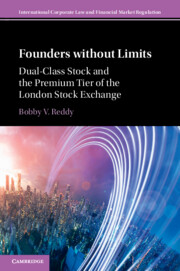12 results
1 - Global Shareholder Stewardship
- from Part I - Foundations
-
-
- Book:
- Global Shareholder Stewardship
- Published online:
- 28 April 2022
- Print publication:
- 12 May 2022, pp 3-43
-
- Chapter
- Export citation
28 - Can a Global Legal Misfit Be Fixed?
- from Part III - Comparisons
-
-
- Book:
- Global Shareholder Stewardship
- Published online:
- 28 April 2022
- Print publication:
- 12 May 2022, pp 599-612
-
- Chapter
- Export citation
5 - From Controlling Shareholders to Dual-Class Stock
- from Part II - Evaluating Dual-Class Stock
-
- Book:
- Founders without Limits
- Published online:
- 29 October 2021
- Print publication:
- 11 November 2021, pp 165-187
-
- Chapter
- Export citation

Founders without Limits
- Dual-Class Stock and the Premium Tier of the London Stock Exchange
-
- Published online:
- 29 October 2021
- Print publication:
- 11 November 2021
2 - Common Law Jurisdictions in Asia: An Overview
- from Part I - Introduction and Overview
-
- Book:
- A Case for Shareholders' Fiduciary Duties in Common Law Asia
- Published online:
- 26 July 2019
- Print publication:
- 22 August 2019, pp 38-96
-
- Chapter
- Export citation
Part II - Role of General Meeting and Shareholders
-
- Book:
- A Case for Shareholders' Fiduciary Duties in Common Law Asia
- Published online:
- 26 July 2019
- Print publication:
- 22 August 2019, pp 97-370
-
- Chapter
- Export citation
1 - Introduction
- from Part I - Introduction and Overview
-
- Book:
- A Case for Shareholders' Fiduciary Duties in Common Law Asia
- Published online:
- 26 July 2019
- Print publication:
- 22 August 2019, pp 3-37
-
- Chapter
- Export citation
Part I - Introduction and Overview
-
- Book:
- A Case for Shareholders' Fiduciary Duties in Common Law Asia
- Published online:
- 26 July 2019
- Print publication:
- 22 August 2019, pp 1-96
-
- Chapter
- Export citation
3 - Powers, Shareholders and Justifications for Duties
- from Part II - Role of General Meeting and Shareholders
-
- Book:
- A Case for Shareholders' Fiduciary Duties in Common Law Asia
- Published online:
- 26 July 2019
- Print publication:
- 22 August 2019, pp 99-332
-
- Chapter
- Export citation
3B - Agency and the Interests of the Company
- from 3 - Powers, Shareholders and Justifications for Duties
-
- Book:
- A Case for Shareholders' Fiduciary Duties in Common Law Asia
- Published online:
- 26 July 2019
- Print publication:
- 22 August 2019, pp 137-204
-
- Chapter
- Export citation
3C - Controlling Shareholders
- from 3 - Powers, Shareholders and Justifications for Duties
-
- Book:
- A Case for Shareholders' Fiduciary Duties in Common Law Asia
- Published online:
- 26 July 2019
- Print publication:
- 22 August 2019, pp 205-272
-
- Chapter
- Export citation
3A - Formal and Informal Power: Voting and Influence
- from 3 - Powers, Shareholders and Justifications for Duties
-
- Book:
- A Case for Shareholders' Fiduciary Duties in Common Law Asia
- Published online:
- 26 July 2019
- Print publication:
- 22 August 2019, pp 99-136
-
- Chapter
- Export citation

